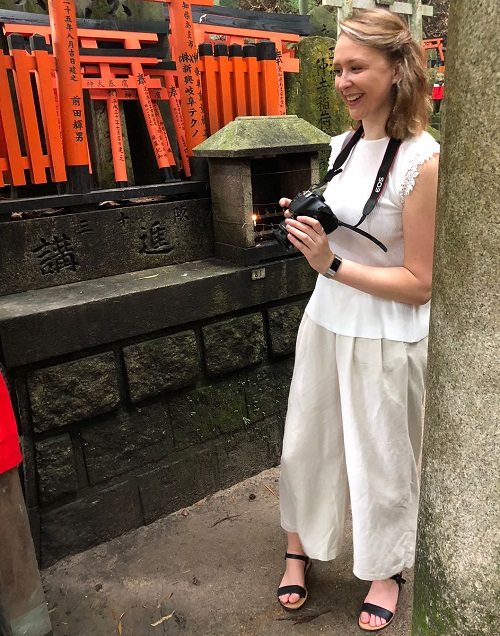Zoë Davidson is a PhD student in the Department of Physics. During her time at Strathclyde, she has become part of the Women in Strathclyde Physics Association (WiSPA) and wrote a blog about equality, diversity and inclusion in the industry. Here, she discusses the importance of gender parity in science.
What do you think are the opportunities and challenges for women in science?
What the opportunities are, and what they should be are still very different–although there are fantastic organisations like Equate Scotland and the WISE campaign that are helping to change this. I believe the opportunity to access and contribute to research, that shapes our scientific landscape that ultimately affects everything we do and use, should be equal for everyone.
However, this certainly hasn’t been the case for women and other underrepresented minorities (URM), and we need to reform the system by removing additional barriers some people face. It is only then, we truly all have “equal” opportunities. Women in science can’t fix this alone, and nor should they have to. Nonetheless, solidarity really does go a long way, particularly within support groups that highlight opportunities and encourage people to “go for it”. As challenges go for all URM, sadly the list is long, including, but not limited to, double dose of impostor syndrome, bullying/harassment, systemic bias, unconscious bias, culture of overwork, presenteeism, and worst of all: a lack of understanding and care to address this from the top down.
Why do you think it’s important to have gender parity in science?
This question in itself shows how far we have to go. To me, it seems ridiculous that we would want a scientific workforce, shaping our future, that isn’t representative of who we all are. We only have to look around at flaws in past policy, products and services to see the shortfalls where other user’s needs haven’t even been considered due to gaps in knowledge and representation at decision-making levels. Do we really want to repeat history? To those who are unsure, I recommend reading “Invisible Women: Exposing Data Bias in a World Designed for Men”, by Caroline Criado-Perez, to learn more on our past mistakes due to gender inequality. But it doesn’t stop there, this extends way beyond gender and we need to remember our fight is to fix this for everyone, not just for white cis-gendered, able-bodied and -minded, straight, financially secure, women—for those are the most privileged of minorities in science. I strongly support equity for everyone, and that’s why my equality advocacy efforts are intersectional and extend beyond WiSPA.
What do you think needs to be done to achieve gender parity?
A lot. There needs to be matched, or greater, focus on the retainment of women in science as there already is on recruitment. As many have said before me, “a leaky pipeline won’t be fixed by simply putting more water in”. Patching up the leak takes genuine effort, commitment, and action, most of which needs to come from the top down. There’s only so much we can action from grass-roots groups like WiSPA, and it isn’t really our responsibility to deconstruct something that wasn’t made by us.
Sadly, we all know why women and URM leave. We know sexual harassment, bullying and discrimination exists. We know it’s hard to report incidents, and that reporting procedures aren’t always easy to access. We know overworking culture and pressure makes science inaccessible for those who want to have a healthy work-life balance. But what we also know is that no university or institute wants to think it’s going on under their roof, and they certainly don’t want it publicised. And sadly, that is a huge barrier that gets in the way of progress here. If we are true in our intentions to patch up the leak, we must not shy away from the uncomfortable questions and data on inequality. People come before PR and, funnily enough, good PR will come naturally to places where people are cared for. We must take a stronger stance against inequality with transparency and accountability. With this, I imagine women and URM, may not just stay in science for longer but, might genuinely want to encourage more URM to join them. This would address the inner conflict some people feel of wanting more people like them in the system but, equally, not wanting them to experience the same challenges that they faced.
Can you describe the main aims of WiSPA and how you got involved?
The main aim of WiSPA is to unite the women in our physics department, and encourage them to stay in physics by providing support and solidarity, and by highlighting opportunities in physics.
I got involved with WiSPA when it formed in 2018. WiSPA was founded by physics Senior Lecturer Dr Alison Yao, and I was delighted to join the committee along with fellow PhD students, Samantha Hume and Araceli Venegas-Gomez, and our Departmental Manager, Gabrielle Weir. Since then, we have grown to support over 100 women in physics at all levels with an organising committee of 11 volunteers.
From a personal perspective, WiSPA came along at just the right time for me. By the 2nd year of my PhD, I started to feel the toll of being the only woman in a research group. I was lonely. Even outside of my group, I barely knew any women in our physics department, and I certainly never saw them regularly or heard about their research. At the time, I was also the only woman physics PhD student and researcher based on the top floor of John Anderson. You might think, “So what, that wouldn’t affect you”—but it did. Paired with other unfortunate experiences, being the “only” of any minority slowly wears away at you, your confidence, enthusiasm and your sense of belonging.
I’m by no means an expert here, but I guess it’s some sort of double dose of impostor syndrome, made up of not seeing people (or having role models) that look like you, and not having someone to talk with about shared experiences of sexism and bias. For me, WiSPA probably retained me in physics in some ways, by giving me that sense of community and support I was missing, especially during an already stressful time of doing a PhD. However, as wonderful it is, I hope as time goes on WiSPA is needed less and will make less of a difference. As more women stay in physics and are happy here, there will be less need for groups like WiSPA to address any shortfalls or gaps in the system. But, until that welcomed day, we will continue.
Read Zoe's article.

